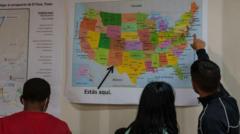Article text:
In a significant shift in immigration policy, the Trump administration has announced that it will revoke the temporary legal status of over 530,000 migrants hailing from Cuba, Haiti, Nicaragua, and Venezuela. This decision has sent shockwaves through communities as affected individuals are being instructed to leave the United States by April 24, prior to the cancellation of their work permits and deportation protections.
These migrants entered the U.S. through a sponsorship process established during the Biden administration, known as CHNV, which was intended to facilitate legal migration for individuals fleeing precarious conditions in their home countries. Once in office, Trump suspended the CHNV programme, leaving many migrants uncertain about their legal standing.
The Biden administration launched this system in 2022, permitting Venezuelans to initially benefit from it, before expanding it to include other nations grappling with turmoil. The Department of Homeland Security (DHS) asserted that the program was meant to alleviate illegal border crossings and to enable thorough vetting of individuals entering the U.S. However, the DHS criticized how the previous administration managed the programme and implied it did not fulfill its intended objectives.
According to a recently released notice in the Federal Register, some migrants may be allowed to remain in the U.S. on a "case-by-case" basis. Karen Tumlin, the founder of the Justice Action Center in California, remarked that the administration's abrupt move could have dire consequences for those who followed the legal process to secure their presence in the U.S. “It is really quite surprising to say that they could revoke a status with such short notice," Tumlin added.
Further complicating the situation, Trump is also deliberating the potential cancellation of another immigration status affecting 240,000 Ukrainian refugees who sought safety from conflict. The CHNV initiative enabled significant numbers of migrants to seek refuge, with over 213,000 Haitians and more than 120,700 Venezuelans benefitting before the program was halted.
In a related context, the DHS recently revealed it would end the temporary protected status (TPS) for 500,000 Haitians this August, a type of protection offered to nationals from countries facing dire circumstances. While TPS for Venezuelans is also on the chopping block, it faces ongoing legal scrutiny.
Trump's aggressive immigration policies continue to be met with resistance and legal challenges since he assumed office, highlighting the larger ongoing debate around immigration reform in the United States.
In a significant shift in immigration policy, the Trump administration has announced that it will revoke the temporary legal status of over 530,000 migrants hailing from Cuba, Haiti, Nicaragua, and Venezuela. This decision has sent shockwaves through communities as affected individuals are being instructed to leave the United States by April 24, prior to the cancellation of their work permits and deportation protections.
These migrants entered the U.S. through a sponsorship process established during the Biden administration, known as CHNV, which was intended to facilitate legal migration for individuals fleeing precarious conditions in their home countries. Once in office, Trump suspended the CHNV programme, leaving many migrants uncertain about their legal standing.
The Biden administration launched this system in 2022, permitting Venezuelans to initially benefit from it, before expanding it to include other nations grappling with turmoil. The Department of Homeland Security (DHS) asserted that the program was meant to alleviate illegal border crossings and to enable thorough vetting of individuals entering the U.S. However, the DHS criticized how the previous administration managed the programme and implied it did not fulfill its intended objectives.
According to a recently released notice in the Federal Register, some migrants may be allowed to remain in the U.S. on a "case-by-case" basis. Karen Tumlin, the founder of the Justice Action Center in California, remarked that the administration's abrupt move could have dire consequences for those who followed the legal process to secure their presence in the U.S. “It is really quite surprising to say that they could revoke a status with such short notice," Tumlin added.
Further complicating the situation, Trump is also deliberating the potential cancellation of another immigration status affecting 240,000 Ukrainian refugees who sought safety from conflict. The CHNV initiative enabled significant numbers of migrants to seek refuge, with over 213,000 Haitians and more than 120,700 Venezuelans benefitting before the program was halted.
In a related context, the DHS recently revealed it would end the temporary protected status (TPS) for 500,000 Haitians this August, a type of protection offered to nationals from countries facing dire circumstances. While TPS for Venezuelans is also on the chopping block, it faces ongoing legal scrutiny.
Trump's aggressive immigration policies continue to be met with resistance and legal challenges since he assumed office, highlighting the larger ongoing debate around immigration reform in the United States.






















